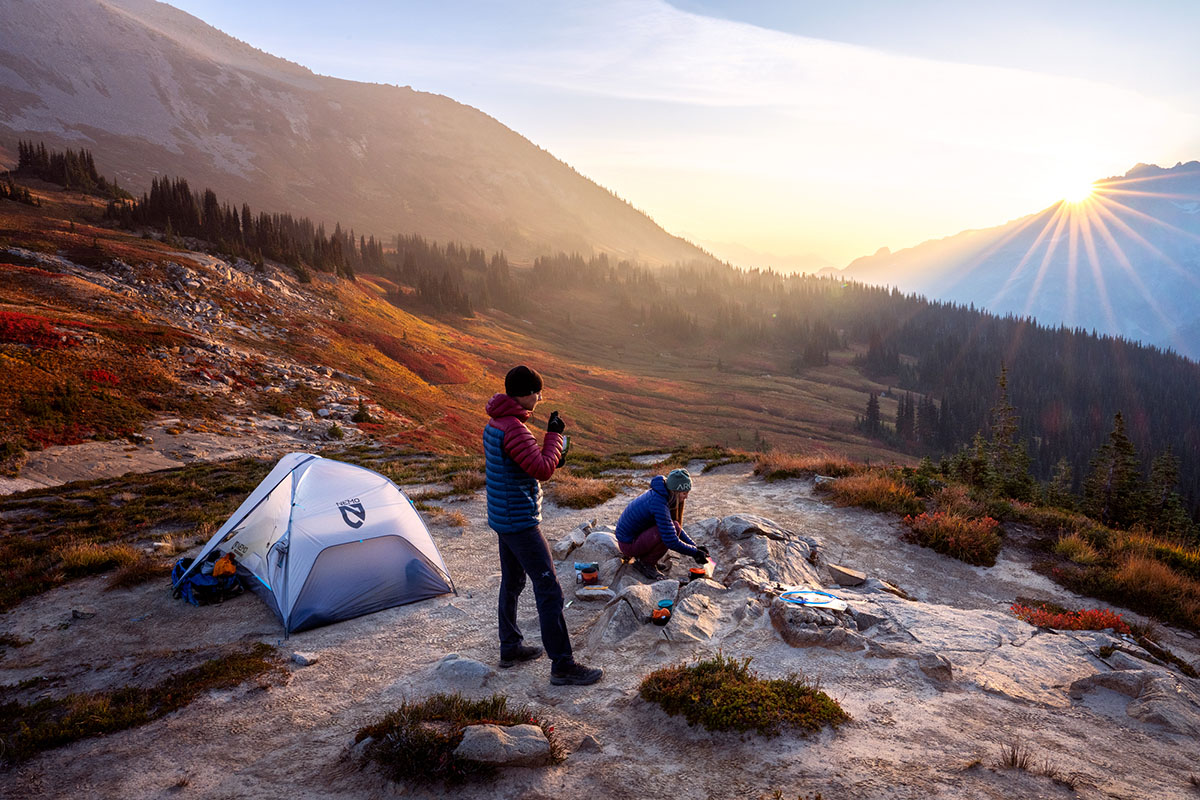Jason Hummel Photography
We use affiliate links and may receive a small commission on purchases. Read more about us.
If you’re researching backpacking tent weight, you’ve come to the right place. Below we’ve put together detailed tent weight comparison tables covering most models available for summer of 2024. For comparison’s sake, all are two-person, three-season tents (many have solo and family versions available as well), and we’ve listed the full packaged weight. The first table includes traditional backpacking tents with poles, and the bottom table has trekking pole-supported shelters that do not come with poles, many of which are single-wall. For the latter, you’ll have to add in the weight of your trekking pole(s) for an accurate total. We’ve also included some key buying considerations below the tables. For a wider and more in-depth look at the market, see our articles on the best backpacking tents and best ultralight tents.
Editor’s note: We updated this article on June 25, 2024, to ensure our lists of backpacking tents and trekking pole-supported shelters were up-to-date. We also expanded the background information below the comparison tables.
The weights that we have listed in the tables above are the packaged or packed weight (our cutoff was 6.5 lb., but many backpackers will want to keep things lighter). This includes everything that comes from the manufacturer: the tent body, rainfly, poles, stakes, guylines, repair sleeve, and tent and stake bags. Another popular spec to list is trail weight, which includes only the tent body, rainfly, and poles, and as a result, winds up about 5 to 7 ounces lighter. Notably, trail weight (also referred to as “minimum weight”) leaves out the stakes, so it’s not an exact representation of what you will be hauling.
That being said, packed weight doesn’t perfectly reflect the weight of what everyone will be taking on the trail. Some manufacturers include quite a few guylines, which you may want to leave behind, and we often ditch the tent pole bag and just strap the poles to the outside of our pack. We still recommend keying in on the packed weight to be safe, but trimming a couple of ounces off that spec is often very realistic. To throw another wrench into the tent weight question, keep in mind that most packaged weights don’t include a footprint. If you value the added floor protection, plan to tack on another 5 to 10 ounces.
On paper, choosing a lightweight tent is a pretty good proposition. They cost more, but you can trim precious pounds off of the weight you’ll be hauling on your back. We’re right there with you, but there are a number of compromises that come with reducing weight, some of which may be no problem and others of which might give you pause.
Two main ways that manufacturers cut weight are: 1) making the fabrics and materials thinner and 2) and reducing interior space. We cover interior space below, so we’ll focus on tent construction here. In comparing similar tents (i.e., freestanding two-person tents with similar interior volume), a tent that’s dramatically lighter will have thinner fabrics, tent poles, and zippers. As a result, durability suffers, and for those who are hard on their gear or aren’t familiar with tent care, you can quickly damage these expensive products.
Nearly all manufacturers list the denier (D) of their floors, tent walls, and rainfly, and the lower the number, the thinner the fabric. Ultralight tents like the Big Agnes Tiger Wall UL2 use a 15D fabric on the floor and rainfly, which pushes the limits of practicality. On the other hand, it’s absolutely awesome for the right person (e.g., thru-hikers and minimalists) who’s willing to treat it like a newborn—you get a completely bug-proof and weather-worthy tent for 2 pounds 8 ounces all in. The durability trade-offs and extra cost are what push people to popular tents like the REI Half Dome SL, which uses a far more durable 40D floor but weighs nearly twice as much as the Tiger Wall. There is a balance, of course, which is why we created the tables above.
From a quick look at the tables, it’s rather obvious that packed size almost always correlates with weight. Simply put, the lighter the tent, the smaller the packed size. And while the actual dimensions are helpful, it doesn’t mean that you need to find space inside or outside your pack to fit a 21 x 6-inch tent burrito. We almost always separate the tent poles from the tent body to better distribute weight among group members and minimize excess bulk. The best use of the packed size specification is to get a general idea of how bulky the gear is for planning out the rest of your kit, like the ideal capacity and style of your backpacking pack.
Unfortunately, interior space is one of the first things to go when trimming tent weight. As a tool for comparison, we like the floor area spec (measuring length by width), but it does come with a caveat: This measurement is taken right at ground level and does not account for the livable space above the floor. For example, take the Big Agnes Fly Creek HV UL2 and Kelty Far Out 2. Both have a listed floor area of around 28 square feet (the Far Out is 27.9 sq. ft.), but they couldn’t feel more different inside—the Far Out’s vertical walls and symmetrical shape feel cavernous compared with the tapered Fly Creek’s tight quarters.
Tent volume, which accounts for the length, width, and angle of the walls, is the spec we really want, but few manufacturers actually provide it (SlingFin is one exception). Until this becomes commonplace, we recommend checking the floor area spec but also taking the time to analyze the tent shape—even just eyeballing it will help quite a bit, but we also advise digging into all of the dimensions (length, width, and peak height) to get a clearer picture. You can also learn a lot from the photos online.
To achieve ridiculously low weights like the 1-pound-2.5-ounce Zpacks Duplex, manufacturers turn to a piece of gear a lot of backpackers already bring along: trekking poles. The main selling point of a trekking pole-supported shelter is that you don’t have to sacrifice interior volume or fabric durability in achieving really light weights. In fact, they’re competitive with and often beat standard tents that weigh twice as much in terms of floor area and tent volume. The biggest downside is added complexity during set-up—it can take some finessing to get a taut pitch, although we’ve found it gets considerably easier with time.
If you’d still like a little help narrowing down your selection, below are our team’s current favorite backpacking tents and ultralight tents broken down by category, from budget-friendly options for those just getting started to specialized, floorless shelters for ounce-counting minimalists. For a wider look at the market and detailed buying advice to help you get started, check our articles on the best backpacking tents and best ultralight tents.
Best Overall Backpacking Tent: Big Agnes Copper Spur HV UL2
Best Budget Backpacking Tent: REI Co-op Trail Hut 2
Best Combination of Price and Performance: REI Co-op Half Dome SL 2+
Best Ultralight Backpacking Tent for Thru-Hiking: Zpacks Duplex Zip
Best All-Season Backpacking Tent: MSR Access 2
Best Overall Ultralight Backpacking Tent: Nemo Hornet Elite Osmo 2P
Best Budget Ultralight Backpacking Tent: Durston X-Mid 2
Best DCF Trekking-Pole Shelter for Thru-Hiking: Zpacks Duplex Zip
Best Ultralight 4-Season Tent: Samaya 2.0
Best Floorless Pyramid Shelter: Mountain Laurel Designs DuoMid
Tent weight is just one part of the larger weight equation, and there are numerous avenues from which you can trim ounces from your pack. What’s commonly referred to as the sleep system (including both sleeping pad and sleeping bag) is another significant opportunity. To help with research, and because looking at the various designs is just plain fun, we’ve put together comprehensive charts comparing one-person tent and shelter weights and sleeping bag weights. As with tents, cutting weight often involves paying more and losing out on some durability, but your back, legs, knees, and ankles will surely thank you in the end.
Back to Backpacking Tents with Poles Back to Trekking Pole-Supported Shelters

